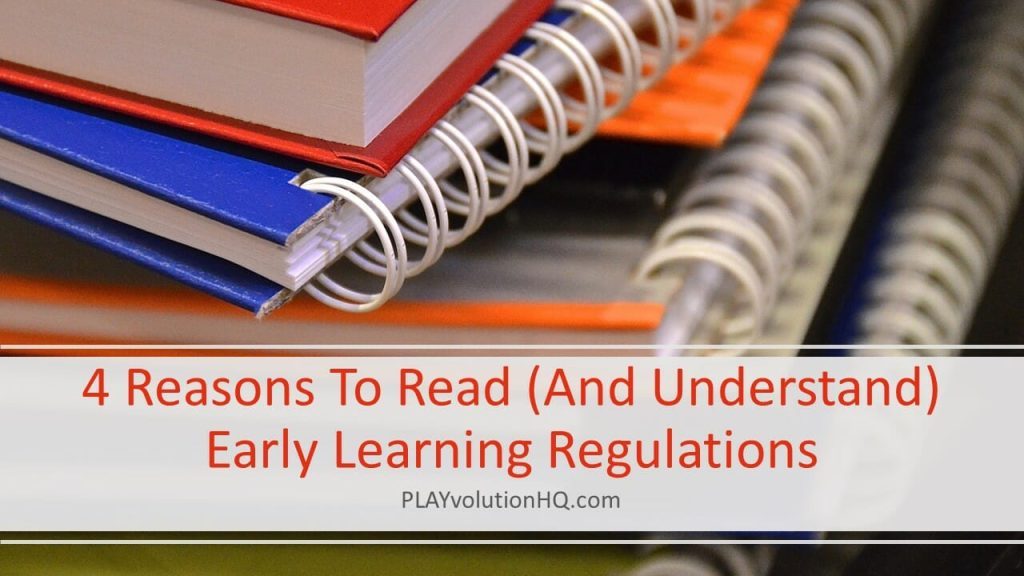
If you’re playing Candy Land with 5 preschools, it helps if everyone understands the rules. If you’re frying a turkey, familiarizing yourself with how to safely use a deep fryer is a good idea. If you work in an early learning program, you should read–and understand–the government regulations the program has to follow. I know the last thing you probably want to do is settle in for a cozy evening with a stack of government regulations that sound like they were transcribed by a confused, slightly drunk chimp hired to take dictation for a committee of educrats and politicians. You should read and understand them anyway, here are four reasons why:
Functional Clarity
Understanding the regulations provides clarity as you preform the daily functions of your job. You know how many adults are necessary for a group of nine two-year-olds. You know when you’re expected to wash your hands throughout the day. You know the process for administering and documenting Kyle’s amoxicillin. You know what’s not allowed when it comes to behavior management and what’s expected when it comes to programming.
Personal Edification
Reading and understanding the regulations for yourself provides direct knowledge of the rules and expectations governing your work. You’re not acquiring the information second or third hand from an employer or coworker–you’re getting it from the source. Such self-study is empowering. It not only helps clarify what’s expected of you, it helps you understand other things happening in the program. It’s easier to understand why the Assistant Director is always a nag about emergency contact forms and shot records when you’ve seen for yourself how much the licensing regulations focus on what’s in a child’s file. Getting to know the regulations for yourself is a way to grow your personal professional practice.
Protective Armor
Knowing the regulations can serve as protective armor. Knowing, from your own research, that the infant room must maintain a 1:4 adult-to-child ratio when the lead teacher wants to leave you alone with six babies while she steps out for a smoke gives you firm footing to speak up when necessary. “I know you need to suck down another unfiltered Camel, Becky, but you’re going to have to wait until your lunch break. I can’t be alone with six babies. We’d be out of ratio.” Becky might not be happy, but you’re saved from the stress of being alone with the six babies and being in trouble with the front office if the State licensing inspector walked in for an unannounced visit and caught you trying to nurture six infants alone while your lead teacher was smoking out back by the dumpster.
Offensive Leverage
Defensive armor is great, but sometimes you need to play offense. Imagine that during a licensing visit, the nice lady with the clipboard from the State says you can’t have more than 1 inch of water in the water play table (or you can’t let kids climb the playground’s apple tree, or you can’t build a campfire and roast marshmallows with the four-year-olds). Having a clear understanding of the regulations allows you to push back a bit. “Sarah, before we decided to let the kids start climbing the apple tree, I re-read the licensing regulations and didn’t see anything prohibiting it. I’ve got my copy of the regs right here, can you show me the page that says the kids can’t climb trees?”
Many regulations have room for interpretation. If you haven’t read them, you don’t have any leverage when negotiating how something is interpreted–when Sarah says stay out of the apple tree, you stay out of the apple tree. When you’ve done your homework and ask to see the regulation that says No Tree Climbing, things go differently. After she points to a paragraph about maintaining a safe environment, you counter by explaining that the environment is safe–you completed a risk assessment, pruned some iffy branches, added mulch around the tree, instituted a 2-climbers-at-a-time policy, and have a teacher nearby when kids are climbing. Then you point to sections in the regulations outlining that kids should be able to play and have time to engage in large muscle activities. If you and Sarah can’t negotiate an agreement on the tree climbing, you also know that you can file an appeal if she writes you up because you’ve read the regulations.
Conclusion
To make it easier to read your regulations, we’ve done our best to collect the regulations for the United States, Canada, and Australia here on the Playvolution HQ site. Just search ‘program regulation’ and the name of your state or province, or browse by country below:
- United States Child Care Regulations
- Canadian Child Care Regulations
- Australian Child Care Regulations
Related Policy And Procedure Forms And Handouts


Post Author
Jeff Johnson is an early learning trainer, podcaster, and author who founded Explorations Early Learning, Playvolution HQ, and Play Haven.

Leave a Reply